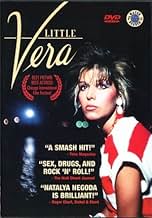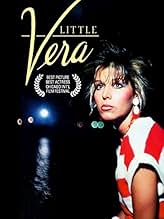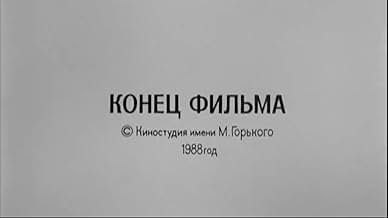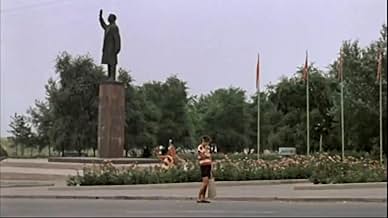CALIFICACIÓN DE IMDb
6.9/10
2.3 k
TU CALIFICACIÓN
Agrega una trama en tu idiomaA teenage girl, who has just finished school feels trapped and aimless in her ordinary Russian family, supported by an alcoholic father, in a dull industrial town.A teenage girl, who has just finished school feels trapped and aimless in her ordinary Russian family, supported by an alcoholic father, in a dull industrial town.A teenage girl, who has just finished school feels trapped and aimless in her ordinary Russian family, supported by an alcoholic father, in a dull industrial town.
- Dirección
- Guionistas
- Elenco
- Premios
- 7 premios ganados y 9 nominaciones en total
Aleksandr Negreba
- Viktor - brat Very
- (as Alexander Alexseyev Negreba)
Aleksandra Tabakova
- Lenka Chistyakova
- (as Alexandra Tabakova)
Gennady Goryachev
- Sledovatel
- (as G. Goryachev)
Vadim Zakharchenko
- Muzhchina v bolnichnoy palate
- (as V. Zakharchenko)
Mariya Khmelik
- podruga Viktora
- (as M. Khmelik)
Maksim Nayrabe
- brat Lenki Chistyakovoy
- (as Maxim Nairabe)
- Dirección
- Guionistas
- Todo el elenco y el equipo
- Producción, taquilla y más en IMDbPro
Opiniones destacadas
This once notorious drama (at least in its own country) was hailed as a breakthrough when first released simply for daring to show modern Soviet life without the usual State-approved propaganda halo, in all its actual anti-bureaucratic grubbiness. But watching the film on this side of the erstwhile Iron Curtain only reinforces the notion that Soviet youth culture is thirty years behind the rest of the world: despite the often oppressive details it might be just another quaint teen delinquency relic from early 1960s Hollywood, dubbed into Russian and updated with casual sex and drug abuse. In other words, it's hardly a revelation to discover that Russian kids are just as misunderstood by adults as their American role models. But while the attitudes may look dated to Western audiences, it's at least an honest attempt to portray something of the boredom and defiant posturing of youth, in a country not exactly noted for addressing its generation gap.
One of the major aspects of "Malenkaya Vera" (called "Little Vera" in English) is that it was the first movie from the Soviet Union that featured a sex scene, albeit a short one. The title is important: Vera is the Russian word for "faith", identifying that punk Vera (Natalya Negoda) has little faith in the Soviet system. And as the movie shows, there's not much faith to be had in it. The opening scene shows the bleak industrial town of Zhdanov, nearly a hell on earth. When Vera's lover Sergei (Andrey Sokolov) moves in with her family, it leads to some unexpected events.
Like in many Russian movies, people's names describe their characters. For example, there's Viktor (remember that "victor" means winner). All in all, this is a good look at the Soviet Union while it was collapsing - and we can see why it was collapsing. Really good.
Like in many Russian movies, people's names describe their characters. For example, there's Viktor (remember that "victor" means winner). All in all, this is a good look at the Soviet Union while it was collapsing - and we can see why it was collapsing. Really good.
Please Note: This review mentions key moments in this film. Do not read if you have not seen the movie!
Vera, the protagonist in the film Little Vera, lives in a closed, cramped world. She is trying to escape, both emotionally and physically, but in the end is no closer to freedom. Most of the reviews I read brought up the recurrent theme of limited space in this movie. The family apartment represents Vera's closed world in the simplest sense. She has no room to move, no room to grow and no room to find herself. Everywhere she turns the finds herself face to face with her mother, father, brother or simply a wall.
However, the family apartment is only one way that the director maintains this constant feeling of confinement. Throughout the film, Vera is rarely shown at a distance. She is always in a small room, or sitting directly next to someone else, or being physically smothered by those around her (Andrei, Sergei, etc.). She is almost always in physical contact with another person. During the rare times that she truly is alone, such as when she is attempting suicide, the camera only zooms in closer. In this way, the lens replaces the walls and smothering humanity, itself becoming an object of confinement.
If visual effects of confinement aren't possible, then sound is used to heighten the sense of disparity. Most of the dialogue in Little Vera, with the exception of less intense moments when the music volume is increased, is shouted, yelled or screamed. Vera's family is constantly in conflict and even the most civil dinner eventually erupts into argument. I found the constant barrage of sound equally as suffocating as the repeated scenes within the tiny apartment, and twice as hard on the nerves. Unlike Vera, however, we could leave when it was all over.
It is hard not to feel sorry for Vera at the end of the movie, but is our sympathy justified? She returns, time and again, to the very apartment and situation that is slowly taking the life out of her. Can she really be considered a victim if she is bringing a lot of her misery upon herself?
Vera, the protagonist in the film Little Vera, lives in a closed, cramped world. She is trying to escape, both emotionally and physically, but in the end is no closer to freedom. Most of the reviews I read brought up the recurrent theme of limited space in this movie. The family apartment represents Vera's closed world in the simplest sense. She has no room to move, no room to grow and no room to find herself. Everywhere she turns the finds herself face to face with her mother, father, brother or simply a wall.
However, the family apartment is only one way that the director maintains this constant feeling of confinement. Throughout the film, Vera is rarely shown at a distance. She is always in a small room, or sitting directly next to someone else, or being physically smothered by those around her (Andrei, Sergei, etc.). She is almost always in physical contact with another person. During the rare times that she truly is alone, such as when she is attempting suicide, the camera only zooms in closer. In this way, the lens replaces the walls and smothering humanity, itself becoming an object of confinement.
If visual effects of confinement aren't possible, then sound is used to heighten the sense of disparity. Most of the dialogue in Little Vera, with the exception of less intense moments when the music volume is increased, is shouted, yelled or screamed. Vera's family is constantly in conflict and even the most civil dinner eventually erupts into argument. I found the constant barrage of sound equally as suffocating as the repeated scenes within the tiny apartment, and twice as hard on the nerves. Unlike Vera, however, we could leave when it was all over.
It is hard not to feel sorry for Vera at the end of the movie, but is our sympathy justified? She returns, time and again, to the very apartment and situation that is slowly taking the life out of her. Can she really be considered a victim if she is bringing a lot of her misery upon herself?
Little Vera is the story of a Russian teenager, her family, and her attempts to find meaning and value in a life sliding increasingly into decay. In her search for meaning, she falls in love with a more intellectual and rebellious Sergei, whose hatred for her deeply flawed parents quickly spirals out of control.
Little Vera is shocking and disturbing in nearly every way. The drinking of the father, the enabling and lack of understanding of the mother, the casual lies and misdirection of the brother, and Vera herself forgiving them all their flaws are all shocking and slightly disturbing to watch. However, the raw honesty of the film somehow manages to become even more shocking than the plot or characters. Set in cramped spaces and vast urban decay, Little Vera presented a vastly different view of Soviet life than had ever been seen before. In fact, Little Vera is a portrait of the collapse of Soviet society painted in shades of pain, desperation, and rust. It is the implosion of a family set against the implosion of an entire social order.
Although painful and desperately unsatisfying, the film itself is definitely worth seeing, if only to understand the feelings and cultures still reshaping Russia today.
Little Vera is shocking and disturbing in nearly every way. The drinking of the father, the enabling and lack of understanding of the mother, the casual lies and misdirection of the brother, and Vera herself forgiving them all their flaws are all shocking and slightly disturbing to watch. However, the raw honesty of the film somehow manages to become even more shocking than the plot or characters. Set in cramped spaces and vast urban decay, Little Vera presented a vastly different view of Soviet life than had ever been seen before. In fact, Little Vera is a portrait of the collapse of Soviet society painted in shades of pain, desperation, and rust. It is the implosion of a family set against the implosion of an entire social order.
Although painful and desperately unsatisfying, the film itself is definitely worth seeing, if only to understand the feelings and cultures still reshaping Russia today.
It's alarming, to say the least, how little the English speaking world knows about Russia's past. Everyone keeps saying Russia, but I grew up in the Soviet Union, and I can't really call it an exclusively Russian film like everyone else. Ironically, this movie was filmed in Zhdanov(Mariupol), which is now a part of Ukriane. The director chose this city because that's where he was from and he wanted to show the reality of life there. This city always been a ghetto. Now it's even worse, since that part of Ukraine is engulfed in a civil war. So the hopeless openededness of this film was right on point. Unfortunately, I have a feeling the main character would most likely die sometime in the 90's to early 2000's. Even moving wouldn't help, cause the whole area of the former Soviet Union later became a total cesspool of violent crime and drug/alcohol addiction.
During the late 80's, right before the Soviet Union collapsed, there was a plethora of similar films, but for some weird reason only this one was known outside of the country. There were films with worse sex scenes before and after this one, and unlike many other countries, there was no censorship, so TV was full of nudity at the time. So I am really confused why this was praised for a "sex scene", or "rock n' roll"(?!). This film is none of that. This era of Soviet film was actually called "Chernuha" which translates as darkness, despair, gritty. Films during this time were full of realism, had this art-house vibe and yet very genuine acting, and always had a somewhat hidden psychological or philosophical dilemma in it. Sounds like Oscar's winner Moonlight. Indeed, if Moonlight took place in the 80's Soviet Union, and instead of drugs people were drinking, it would fit right in. Some scenes are almost identical with those Soviet films. (i.e. filming a pot on a stove for a good 1 minute or so, or a character is staring at something or thinking for a long time.) I actually seen a lot of them when I was a kid, but it took me decades to watch most of them again. Many never been preserved and therefore are in a very bad shape and some I still can't find, so they were pretty much lost during the switch to the digital format. During the 90's, Russian society rejected everything from the Soviet era. Even this film would have probably been lost if it wasn't for this unusual international hype about it because of some naive sex scene.
There are some odd moments in the film that I only noticed when I watched it as an adult. There is really good and rare collector's items Italo-Disco(CC Catch) blasting from TV during the house party. A phenomena of an underground music style in North America that was only played at gay clubs, was actually a mainstream thing in the Soviet Union. Then there is a clear pedophile situation at a cafe between a man and a very young girl. Another strange scene is where Vera gets accidentally hit by a pot in the head by her drunk girlfriend with a black kid. It was also sort of disturbing to see how she was calling him names and screaming at him when she was drunk, which followed by a scene where he was alone watching a silly cartoon on TV about staying away from Africa because it has dangerous animals, while it's very obvious that life for this kid with black skin in that hell hole of a town is probably worse than being in an African jungle...
The film is as real as it gets. The life was like this for most of the Soviet Union back then. So I definitely would recommend it as a learning artifact. Also Vera means hope. So the name of the film in Russian means also "A very little hope".
During the late 80's, right before the Soviet Union collapsed, there was a plethora of similar films, but for some weird reason only this one was known outside of the country. There were films with worse sex scenes before and after this one, and unlike many other countries, there was no censorship, so TV was full of nudity at the time. So I am really confused why this was praised for a "sex scene", or "rock n' roll"(?!). This film is none of that. This era of Soviet film was actually called "Chernuha" which translates as darkness, despair, gritty. Films during this time were full of realism, had this art-house vibe and yet very genuine acting, and always had a somewhat hidden psychological or philosophical dilemma in it. Sounds like Oscar's winner Moonlight. Indeed, if Moonlight took place in the 80's Soviet Union, and instead of drugs people were drinking, it would fit right in. Some scenes are almost identical with those Soviet films. (i.e. filming a pot on a stove for a good 1 minute or so, or a character is staring at something or thinking for a long time.) I actually seen a lot of them when I was a kid, but it took me decades to watch most of them again. Many never been preserved and therefore are in a very bad shape and some I still can't find, so they were pretty much lost during the switch to the digital format. During the 90's, Russian society rejected everything from the Soviet era. Even this film would have probably been lost if it wasn't for this unusual international hype about it because of some naive sex scene.
There are some odd moments in the film that I only noticed when I watched it as an adult. There is really good and rare collector's items Italo-Disco(CC Catch) blasting from TV during the house party. A phenomena of an underground music style in North America that was only played at gay clubs, was actually a mainstream thing in the Soviet Union. Then there is a clear pedophile situation at a cafe between a man and a very young girl. Another strange scene is where Vera gets accidentally hit by a pot in the head by her drunk girlfriend with a black kid. It was also sort of disturbing to see how she was calling him names and screaming at him when she was drunk, which followed by a scene where he was alone watching a silly cartoon on TV about staying away from Africa because it has dangerous animals, while it's very obvious that life for this kid with black skin in that hell hole of a town is probably worse than being in an African jungle...
The film is as real as it gets. The life was like this for most of the Soviet Union back then. So I definitely would recommend it as a learning artifact. Also Vera means hope. So the name of the film in Russian means also "A very little hope".
¿Sabías que…?
- TriviaThis was the first Soviet film to depict graphic sexual intercourse on screen.
- Bandas sonorasHeaven And Hell
(uncredited)
Written by Dieter Bohlen
Performed by C.C. Catch
Produced by Dieter Bohlen
[plays during playback of the video clip of the same name C. C. Catch]
Selecciones populares
Inicia sesión para calificar y agrega a la lista de videos para obtener recomendaciones personalizadas
- How long is Little Vera?Con tecnología de Alexa
Detalles
Taquilla
- Total en EE. UU. y Canadá
- USD 1,262,598
- Fin de semana de estreno en EE. UU. y Canadá
- USD 23,950
- 16 abr 1989
- Total a nivel mundial
- USD 1,262,598
Contribuir a esta página
Sugiere una edición o agrega el contenido que falta






























